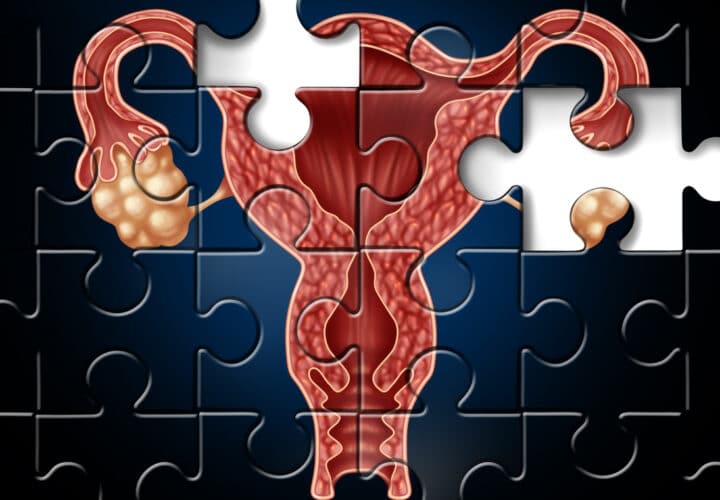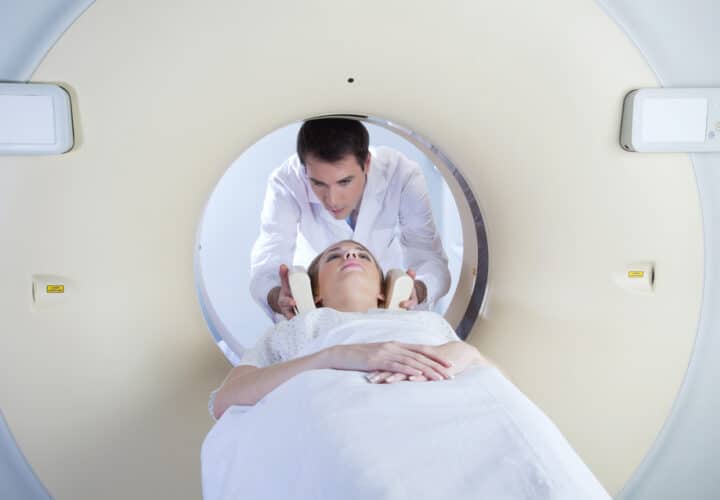Dr. Pauline Maki of the University of Illinois at Chicago shares her insights on the link between estrogen, menopause and dementia.
Women in their 40s and 50s often say their memory is getting worse. Do hormones have an impact on their cognitive abilities? Dr. Pauline Maki, a professor of psychiatry and psychology at the University of Illinois at Chicago, says that new research shows that hormonal changes during menopause could affect memory.
- Women should start hormone therapy shortly before menopause as this is when cognitive abilities begin to change
- While previous research suggested that women should try hormone therapy for a short period of time and then stop, new studies suggest some women should continue using it for longer periods of time, depending on the symptoms they are treating
Being Patient spoke to Maki about how menopause and the hormone estrogen affects the brain, whether women should use hormone therapy and the connection between a drop in estrogen and neurodegenerative disorders like dementia.
Being Patient: As women enter their 40s and early 50s, they sometimes say, “I feel like my memory is getting worse.” Is there any truth to that?
Dr. Maki: Yes. Both men and women experience changes in their memory and other cognitive abilities like attention and concentration as they age. Is there an additional effect of ‘reproductive aging,’ or the menopausal transition on cognitive performance among women? We used to think the answer was no, but there are now two large prospective studies that follow the same cohort of women from the time they’re premenopausal to postmenopausal. Those women experience what appears to be a transient decrease in objective memory performance as they transition through menopause.
Being Patient: Why does a fluctuation in hormonal levels impact the brain?
Dr. Maki: There’s two general ways that we think the hormonal changes of menopause can influence cognitive performance. One is through the direct effects of estrogen and progesterone on brain systems. We know that the hippocampus and the prefrontal cortex, areas of the brain that are rich in estrogen receptors and are key to our success in remembering, respond differently to fluctuations in estrogen, whether it follows removal of the ovaries, which is done surgically in some women, or across the menstrual cycle. Those brain areas change in their sensitivity. That’s what we would call the direct hormonal effect, so that’s one direction. The second one is through menopausal symptoms. Menopausal symptoms can also affect cognitive performance and the most common symptom is sleep disruption. Sometimes it’s related to hot flashes, and we have some data to suggest that hot flashes may contribute to memory decline in women. We have the direct effects of the hormone plus the effects of menopausal symptoms.
Being Patient: You followed a cohort of women for a long period of time. How did you test their memories before menopause, during menopause and after?
Dr. Maki: The cognitive abilities that appear to be changing during the menopausal transition are cognitive abilities that show a female advantage, compared to men. Relatively speaking, men, for example, perform better on tests of visual-spatial abilities, an advantage in men that’s thought to be driven in part by higher levels of testosterone. Conversely, women show a lifelong advantage in verbal memory. It’s tested with word lists. So if you think about a grocery list, can you learn the grocery list over successful trials or remember it after a delay? That’s a very common method of testing verbal memory. We have a sense that these tests are sensitive to estrogen because women show a decrease in performance on the verbal memory tests when their ovaries are removed and adding back estrogen reverses those deficits. That’s a very strong piece of evidence for this particular verbal memory ability being sensitive. So in general, we take that evidence, use those specific word-list learning tests, and administer them annually to women as they transition through menopause.
Being Patient: Should women all go on hormone replacement therapy and if so, when?
Dr. Maki: Hormone therapy is not indicated for cognitive problems and it’s not indicated for the prevention of Alzheimer’s disease. So what are the effects of hormone therapy on cognitive function, and perhaps even later risk of Alzheimer’s for women who are using the hormone therapy for the main purpose? That main purpose is to treat hot flashes, since 80 percent of women experience hot flashes as they transition through menopause. For many women, these are very disruptive and they also disrupt sleep because women wake up in what’s called a night sweat. When we think about the timing of initiation of hormone therapy, we want to think about the timing of initiation in relation to those specific symptoms.
Being Patient: Should you wait for the symptoms to come or start hormone replacement therapy when you’re approaching menopause?
Dr. Maki: The menopausal symptoms begin during the perimenopause. There’s early-perimenopause when women’s cycle lengths change. That’s when we can measure these changes in memory performance. Women might not even know that they’re in the perimenopause and yet the cognitive abilities are shifting during that time. When women get into the late-perimenopause, that’s when they skip a period. They go 60 days without a period. During that phase is when we see the largest changes in memory performance. The good news for women is that memory performance bounces back, it appears, during post-menopause. If the memory changes are occurring during this perimenopausal transition, then the window of opportunity for women to start hormone replacement therapy is during perimenopause and not much later.
Being Patient: Does that mean we only need a short period of hormone replacement therapy?
Dr. Maki: The question is, what is the symptom that the woman is treating with the hormone therapy? If it’s based on motor symptoms, hot flashes and night sweats, then we used to think that those symptoms went away a couple of years after the final menstrual period. We now know that for 30 percent of women, those symptoms continue for more than a decade after the final menstrual period. In response to this new epidemiological data, the Endocrine Society, the North American Menopause Society and the International Menopause Society have all gotten together to have what’s called a global consensus statement to say that there is no stopping rule. The idea that a woman should use it for five years and then stop really is not grounded in this new appreciation for how different women can transition through menopause, and for some, the fact that these symptoms continue. It’s important to have continued checkups when women are on hormone therapy, but again, women are treating the symptoms, not the memory problems.
Being Patient: There are a lot of different hormones on the market today, so what are the differences between hormones that are available to women?
Dr. Maki: There’s two general categories of hormone therapy. There’s what we call estrogen-alone therapy. Estrogen-alone therapy is given to women who do not have a uterus. Women with a uterus need a form of progesterone, so if it’s synthetic, we call it a progestin. They need a form of that to protect the uterine lining against cancer and the addition of that progestin to the estrogen completely takes away the increased risk for that form of cancer, so that’s why women need it. Hysterectomized women need estrogen-alone, whereas women with a uterus need estrogen, plus progestin.
Then the next decision is what form of estrogen women might take. The safest approach to getting what’s called bioidentical hormone therapy, or a form of estrogen that’s most similar to that which our ovaries produce, is trying 17 beta-estradiol, which many practitioners recommend and is available in a patch and a pill.
The second decision for women with a uterus is what form of progesterone they might want to use. Many providers recommend [a natural progesterone called] micronized progesterone because it is like 17 beta-estradiol in that it is most similar to what women naturally produce. There are however a variety of different synthetic progestins. Many women are exposed to these in the form of oral contraceptives or birth control pills and those are also known to be safe options for women.
Being Patient: Does hormone therapy affect people differently, based on whether or not they have a family history of Alzheimer’s?
Dr. Maki: There is not evidence to suggest that hormone therapy increases the risk of Alzheimer’s disease or dementia any more in women with a family history of Alzheimer’s disease. Age is the largest risk factor for Alzheimer’s disease and much of the family history of Alzheimer’s disease can be traced to longevity.
Being Patient: Is it ever too late to start hormone replacement therapy?
Dr. Maki: We want to consider the use of hormone therapy for symptoms. There is data to suggest that women continue having menopausal symptoms for more than a decade after the final menstrual period. However it does appear from the best-quality studies that hormone therapy, particularly combination estrogen plus progestin, is less safe the more years after the final menstrual period—especially in women in their 60s and 70s. What’s interesting about that idea is that there’s also very good data to suggest that it’s the women who are showing objective cognitive difficulties in their 60s and 70s who are actually responding the most negatively to hormone therapy. We do not recommend that women initiate hormone therapy if they transitioned through menopause many years ago.
Being Patient: Do hormonal fluctuations impact men’s cognition as well?
Dr. Maki: Whereas women experience dramatic fluctuations of estrogen followed by a plummeting of estrogen that remains plateau and very low for the rest of their lives during perimenopause, men experience a very gradual loss of testosterone that begins in the late 50s and early 60s. There are rather large differences among men. Some men experience decreases in testosterone, while others experience only subtle decreases. Some data shows that men who maintain higher levels of testosterone as they age have higher brain functioning and brain structure and a lower risk of Alzheimer’s. That’s of interest to us because testosterone is aromatized—it’s converted to estrogen in people with high levels of testosterone, so some of the data’s very consistent with the idea that estrogen can be neuroprotective.
Being Patient: What do we know about the link between a drop in estrogen and neurological conditions like dementia?
Dr. Maki: The strongest data to suggest a link between menopause and Alzheimer’s disease comes from longitudinal studies that follow women who transition through menopause early. Those studies surgically induced menopause. Women who had menopause induced before the age of 50 had a 70 percent increased risk of cognitive impairment or Alzheimer’s disease as they aged. The good news is that that increased risk was completely offset by the use of estrogen-alone up until the age of 50.
Then there’s a question about whether or not the fact that women transition through menopause might be responsible for the data that shows two-thirds of Alzheimer’s patients are female. That increased frequency of Alzheimer’s disease among women compared to men is driven by women’s longevity. Women’s longevity is the biggest risk factor for Alzheimer’s since women live longer than men. There is, however, some suggestion that estrogen might offset some of the pathology of Alzheimer’s disease.
This idea that hormones are safer for younger women is known as the critical window hypothesis and those data provide women with some reassurance that if they treat their vasomotor or menopausal symptoms early, it’s safe, whereas delaying might be detrimental.
Being Patient: What should future research on the impact of hormones on cognition focus on?
Dr. Maki: A key question that’s remaining is whether or not hormone therapy may confer cognitive benefits to women with vasomotor symptoms. There have been at least three very high-quality randomized trials of hormone therapy in cognition in younger postmenopausal women, each showing that it’s safe. However, we don’t know what hormone therapy does to women who have moderate to severe hot flashes and that’s why women take hormone therapy: to treat hot flashes. The final area that Rebecca Thurston and I are exploring is this idea that hot flashes might contribute to memory problems. When women have hot flashes, there’s a surge of stress hormones. Our evidence shows hot flashes are related to changes in brain structure, brain function and memory performance. We’re investigating whether treating hot flashes might confer a cognitive benefit to women.



This presumption that certain hormones are ONLY for reproduction or the organs used for them-make me sick. There is no way of knowing exactly how these hormones are needed,for the heart and mind to continue to function properly. Science and medicine–as not come that far for FEMALES. Love how males are told to keep THEIR main hormone UP as long as they feel it helps. Same bias as always towards women as always and well being.
I had no idea about the relationship existed between hormonal imbalance and memory. The hormonal imbalance might trigger several health-related issues including dementia. So, a person should take suitable precautionary measures to stabilize the hormonal imbalance. The fact is that everyone should be aware of the effectiveness of BHRT to treat hormonal imbalance.